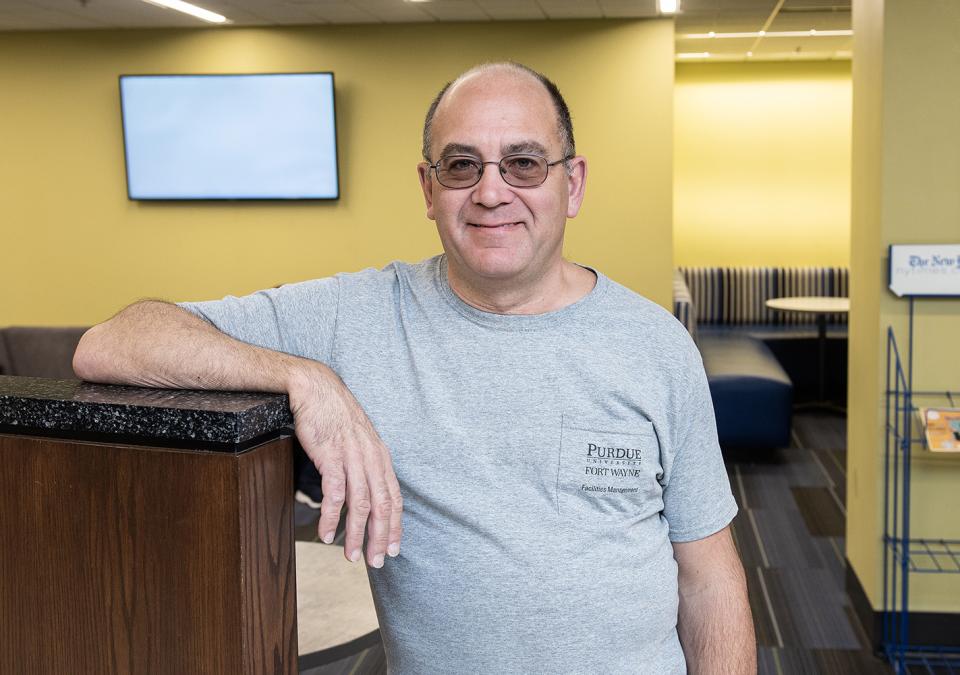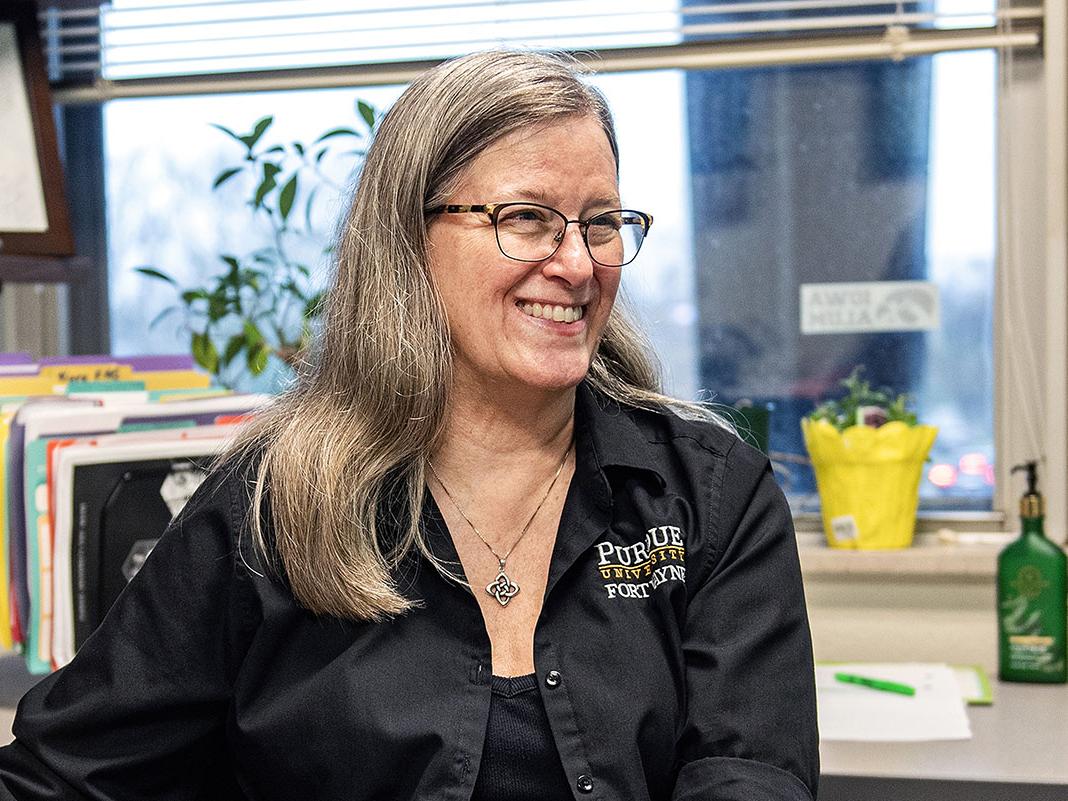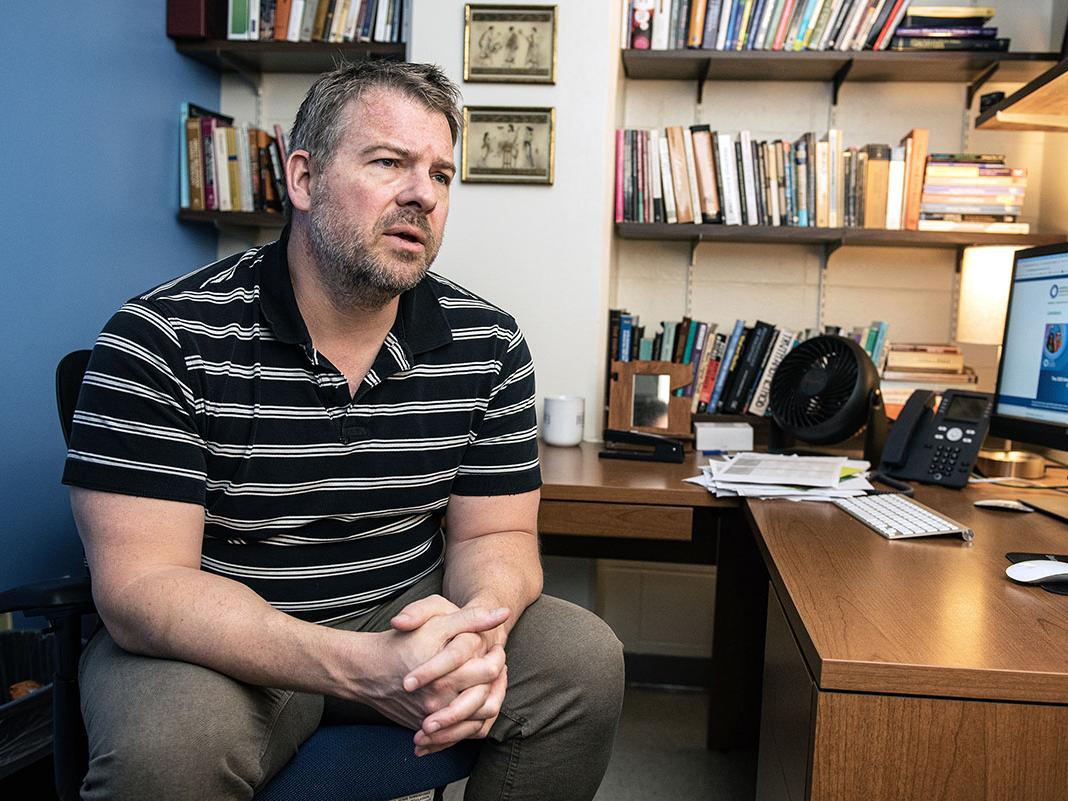
Dedicated People, Positive Progress
Out of the limelight, McCagg's quiet professionalism makes PFW shine
Jerry McCagg, building services supervisor
Shortly after he gets to his desk at 7 o’clock every morning in the basement of Kettler Hall, Jerry McCagg checks his computer for work orders and emails, and then his phone to see if anyone called in sick.
And then the building services supervisor starts pitching in wherever on whatever needs done, whether his five-person day staff of custodians needs help on a problem, or he just notices something out of place as he walks through the hallways. After 35 years on the job, he’s trained himself to notice the little things so they get fixed before becoming big things.
“You wouldn’t believe how crazy it is for him sometimes because people call and say, ‘We need this done,’ or ‘We need that done,’” said McCagg’s supervisor Ed High, the director of building services. “He’s always moving and got something to do. There’s always something that needs done.”
Usually, it’s McCagg’s job to make sure things get taken care of before something becomes too noticeable at Purdue University Fort Wayne. Working inside campus facilities — some 50-plus years old — that are filled with active, energetic bodies almost every day means they usually need some TLC to look as good as they do. If you just go through the motions, the lack of detail usually shows up.
Which kind of explains why most people on campus don’t always notice McCagg and his crew, or any of the janitorial services or maintenance employees for that matter. These unsung heroes care about doing their job correctly and then getting out of the way.
“It’s when you don’t hear anything that you’re doing good,” High said. “Sometimes people take it for granted.”
McCagg started working as a third-shift custodian on campus in 1987 at age 18 after graduating from New Haven High School. He thought he’d try cleaning and see how he liked it but didn’t have a plan where it could become a career. A few years later, he interviewed for a lead position.
“I moved around to different buildings, but I really didn’t know how everything worked on campus until I came to daytime,” McCagg said. “I don’t have one assigned building. If I have staff sending me something that goes on in the daytime in a building, and my staff can’t do it, I help out. I’m responsible for the whole campus.”
A few weeks ago, the toilets in the mobile classroom overflowed, so McCagg and one of his staff ran over to clean it up. He’s not the type of boss who tells other people to do the dirty work, but usually helps out. A lot of times, he just takes care of it himself if he can.
“I’ve done this a long time, and I’m still learning because campus keeps changing all the time,” he said. “We’re getting different kinds of work orders now, and you sometimes have to clean after events, and you may not have a lot of time between those events.”
People like McCagg are always working in the background, taking care of the institution by being reliable. It’s rare they experience the same tasks two days in a row, and they often get out of the way once the students, staff, and faculty get going.
They are the backbone of places like universities, almost invisible at times, but critical at maintaining the facilities so that everyone else can take them for granted. That care is not something that just happens, but has to be sustained every day.
“It takes a lot of people to keep this campus going, a lot of people doing different stuff,” McCagg said.
Their work keeping the buildings clean sets a standard and tone for how the places are to be treated and respected. As an example, the bathrooms are among some of the most high-volume places on campus, and they are relatively small, but they are always clean because someone cares enough to do it with pride.
“The fun part of the job is when it’s done and you can look at it, and it’s clean,” McCagg said. “You can see people who are smiling and are happy. If you get to see people who are happy, that’s a good day. If you can keep people content, half the battle of your job is done. We all take pride in this place.”
And a lot of that starts with him.
“I think he cares about his people,” custodian Ron Gumbert said. “He just cares about what goes on and takes care of his people.”
If McCagg is lucky, by 3 p.m. it’s time to go home to his wife Kristi and walk their dogs. There will always be more to do around campus tomorrow morning.







